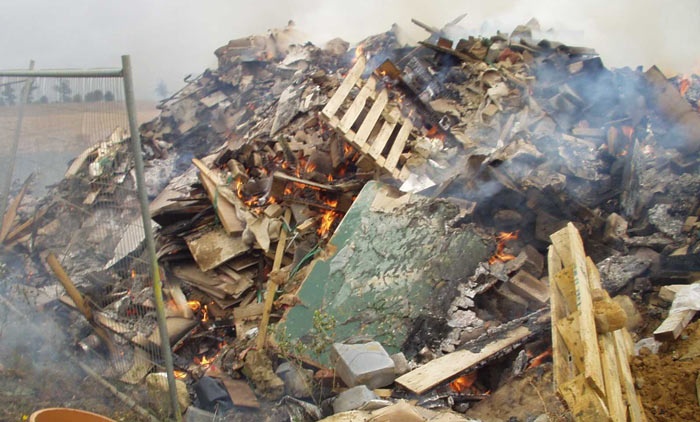Rural businesses putting themselves at risk of waste crime through law ignorance
Half of rural businesses are putting themselves at risk of prosecution for waste crimes because of a ‘fundamental lack of understanding of key legislation’, according to new research.
The ‘right Waste, right Place’ (rWrP) campaign this week published new research that suggests many agricultural businesses are unwittingly putting themselves at risk of legal action, for failing to comply with waste management regulations in accordance with ‘Duty of Care’ law.
 The research found that the primary reason businesses were not complying was a simple lack of awareness of the legislation and how it applies to them.
The research found that the primary reason businesses were not complying was a simple lack of awareness of the legislation and how it applies to them.
According to the Duty of Care, all businesses are required to ensure that their waste is legally disposed of, with those failing to comply running the risk of being hit with an unlimited fine in England and Wales and up to £5,000 in Scotland and Northern Ireland.
The campaign, run by the Environmental Services Association (ESA), conducted telephone interviews with over 500 rural businesses, mainly small and medium sized enterprises (SMEs), all from the agricultural sector. Nearly all survey respondents asserted that they were compliant with Duty of Care law. However, previous studies carried out by rWrP suggest that, in reality, only half are likely to be compliant. Environmental Services Association (ESA) research shows that 94 per cent of offending organisations are SMEs.
Lack of understanding of the key legislation appeared to be the main reason businesses were found not to be compliant, with many simply unaware of their obligations, leaving themselves open to fines, prosecution and even imprisonment.
Local authorities in England spent £49.8 million clearing up illegally dumped waste in 2015/16, dealing with a total of 936,000 fly-tipping incidents, a four per cent increase on 2014/15 statistics. Councils also spent £16.9 million pursuing enforcement actions during the same period. Between 2007 and 2013, reported fly-tipping incidents had been steadily declining, but since then have been increasing year on year.
The research also found that 32 per cent of agricultural businesses and rural landowners have been victims of waste crime, with reports of incidents of fly-tipping on their land over the last three years. This increased to 43 per cent in certain areas such as London and the South East. Reports from the Country and Land Business Association (CLA) estimate the clean up cost as a result of fly-tipping on private land is somewhere between £100 million and £150 million.
Nicky Cunningham, Deputy Director of Waste Regulation at the Environment Agency, which supports the rWrP campaign alongside Natural Resources Wales and the Chartered Institution of Wastes Management (CIWM), said: “It’s crucial that all businesses understand their duty of care responsibilities for the waste they produce. Too often, when these responsibilities are misunderstood or ignored, we see the impact of waste crime where waste is deliberately dumped on land with no permit.
“This can cause serious pollution, put communities at risk and undermines legitimate businesses that are doing the right thing. And even if the landowner has no involvement, legally they may still be responsible for that waste and that could mean a large clear up bill.”

right Waste, right Place
The rWrP campaign was launched by the ESA to help small businesses meet their Duty of Care obligations by offering practical advice on how to manage waste safely and efficiently. In August 2016, rWrP launched its Ambassador programme to get prominent waste organisations to help inform small businesses of their waste responsibilities and to prevent waste crime, in line with the Duty of Care.
Following on from this research, the campaign has now created sector specific resources to aid in increasing awareness amongst rural businesses around their Duty of Care obligations. Resources include reference guides such as the ‘Agriculture Simple Guide to Duty of Care’, case studies and Need to Know cards. rWrP will also be appearing at several events across the country such as agricultural fairs, providing information and advice. The campaign has also produced an animated video explaining Duty of Care.
Dr Colin Church, Chief Executive of CIWM, said: “We know that many agricultural businesses are actively trying to do the right thing with their waste, taking steps to make sure it doesn’t fall into the hands of waste criminals. However our latest research shows that rural communities are still suffering from the results of bad practice.
“The unrelenting nature of rural business means constant demands on the time of what are often small enterprises with few staff. Whilst this can be tough, being efficient yet diligent in the way waste is dealt with can lead to savings, environmental benefits and opportunities to diversify. However the key is to fully understand the legislation and it appears that many do not.
“The ‘right Waste, right Place’ campaign is here to help businesses achieve their potential when it comes to waste practices and we really want to bring together the industry to tackle the issues in partnership.”More information about right Waste, right Place can be found on the campaign’s website.







